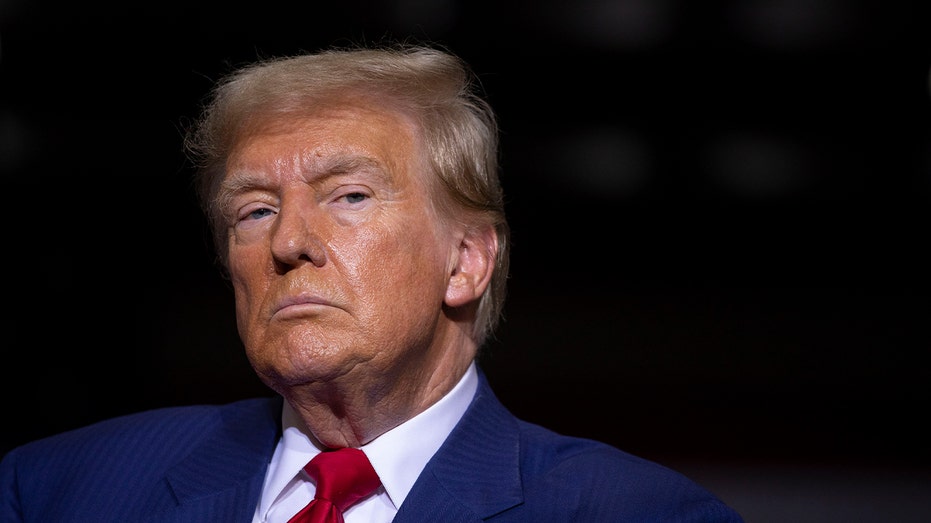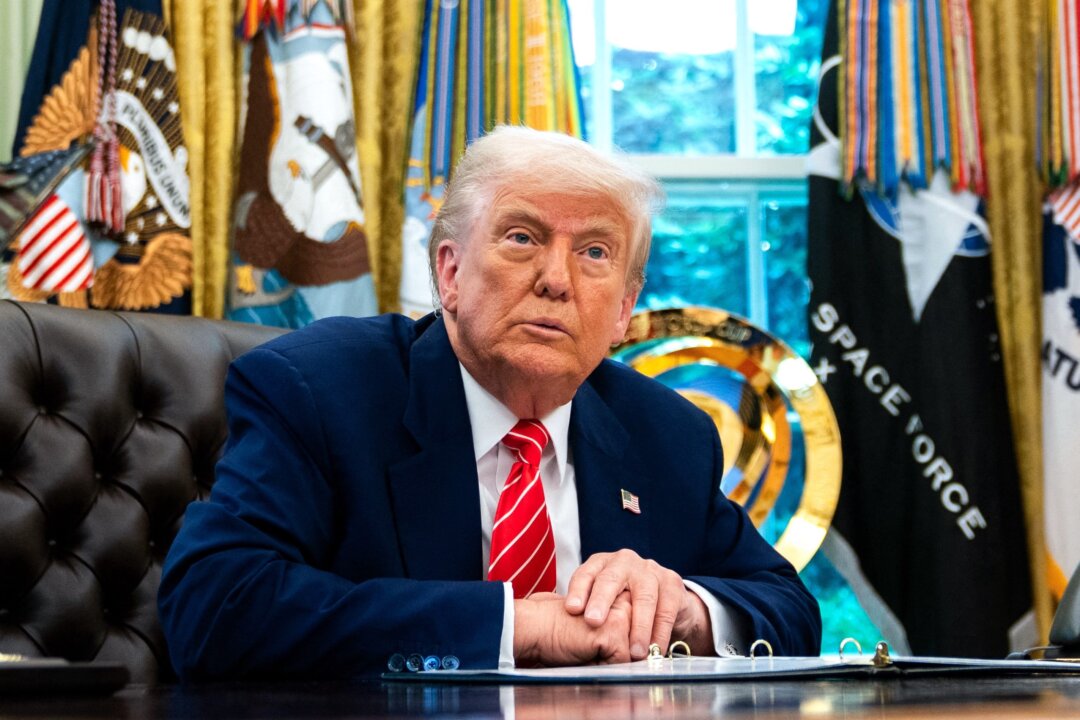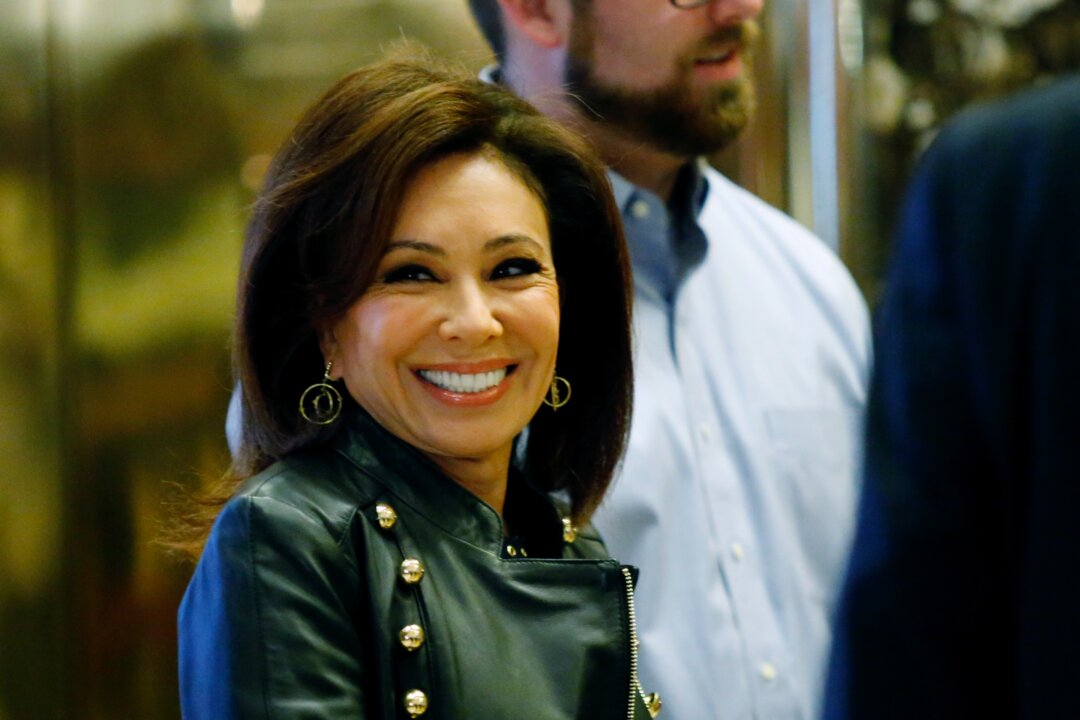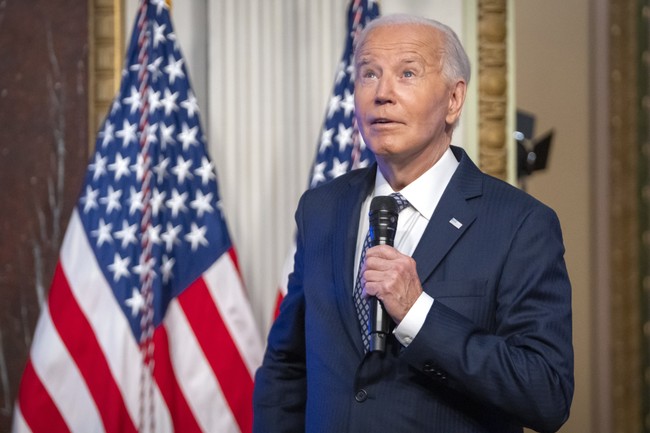As Democrats cast about for a strategy to thwart President Donald Trump’s agenda, rebrand their party and take back power, Sen. Elissa Slotkin recently offered one intriguing idea: Build a shadow Cabinet.
The shadow Cabinet, as envisioned by the Michigan Democrat in aninterview with POLITICO, could be composed of the ranking members of congressional committees who could then take the lead in challenging the Trump administration. It’s a common feature of opposition politics abroad and could be a way for Democrats to flood the media zone and deliver a coordinated response to Trump’s most wild maneuvers. But … ranking members?
Ranking members have their uses. They’re good at reclaiming their time and making motions to recommit. But they are not the fresh faces who can give the Democratic Party a sleek new look.
Nor are the thirsty crop of presidential wannabes right for a shadow Cabinet. Everything they say would be parsed for self-serving motivation, distracting from the party’s broader task at hand.
So how best to assemble a shadow Cabinet? Tap accomplished people with the ability to speak plainly and the credibility to puncture the Trump administration’s often Orwellian narratives. Don’t limit members to professional politicians. Pitch a big tent. Don’t draw rigid ideological lines.
What would such a shadow Cabinet look like? If you gave me the power to appoint, here are my fighters:

Samantha Power
SHADOW SECRETARY OF STATE
Samantha Power has long been a powerful voice in American foreign policy, whether she was serving as Barack Obama’s Ambassador to the United Nations or as Administrator of the United States Agency for International Development under Joe Biden.
She’s often spoken persuasively about the wide range of humanitarian assistance USAID has provided to vulnerable people around the world. Of course, I have to say “provided” and not “provides” because the Trump administration has effectively shuttered the agency and fired all of its employees.
As the last person to win Senate confirmation to lead USAID, Power knows more than anyone how Trump’s extraordinary foreign policy shifts will harm both lives and America’s long-term interests.
Democrats need not shy away from defending foreign aid. While some Democratic strategists at the beginning of Trump’s second term cautioned that sending money overseas was too unpopular to merit fighting for, polling since the decimation of USAID has buttressed the opposite argument. According to the Pew Research Center, 83 percent of Americans support “providing medicine and medical supplies” and 78 percent support “providing food and clothing” to people in developing countries. Only 35 percent support ending most USAID programs.

Lina Khan
SHADOW SECRETARY OF THE TREASURY
As Federal Trade Commission Chair under the Biden administration, Lina Khan roiled Corporate America with an aggressive antitrust approach that won her plaudits from progressives.
But some notable populist Republicans were also impressed. Then-Sen. JD Vance said last year that Khan was “one of the few people in the Biden administration that I think is doing a pretty good job.” Shortly after Trump’s inauguration, former Trump adviser and MAGA movement podcaster Steve Bannon said, “I would be a huge supporter of Lina Khan remaining, and I would love to see her given more power.”
With populist cred that has transcended party lines, Khan is well positioned to go toe-to-toe with the current Treasury secretary, challenge Trump’s close ties to tech oligarchs like Elon Musk and prosecute the case against Trump’s economic policy. She’s already gotten a head start, recently appearing on MSNBC to charge Trump’s tariffs as economic “malpractice,” which will leave small businesses “decimated.”

General Charles Q. (C.Q.) Brown, Jr.
SHADOW SECRETARY OF DEFENSE
General C.Q. Brown, another casualty of Trump’s axe, would make a fine shadow Defense secretary. The second African American to serve as chair of the Joint Chiefs of Staff, Brown was marked by current Defense Secretary Pete Hegseth as the face of diversity, equity and inclusion programs loathed by MAGA.
Why? Because of what happened in 2020, at the tail end of Trump’s first term when Brown was nominated by Trump to lead the Air Force. Days before his Senate confirmation, and days after the shocking murder of George Floyd, Brown recorded a heartfelt video about racism and military service. When Brown won confirmation, Trump celebrated it as a “historic day.” Yet The New York Times later reported, citing an unnamed presidential adviser, that “in Mr. Trump’s eyes … there was no coming back for General Brown after he made his video.”
Hegseth published a book last year which telegraphed his desire to fire Brown. “Was it because of his skin color? Or his skill?” Hegseth asked about Brown’s final promotion.
But Hegseth is not exactly the personification of meritocracy, let alone competence. He has been caught sharing classified information on unsecure phone apps. He fired three close aides ostensibly for leaking, though another Pentagon aide who had resigned wrote a POLITICO Magazine op-ed that said the rationale given by Hegseth was untrue and “easily debunkable.” A New York Times exposé of Hegeth’s team found “screaming matches,” “bureaucratic logjams” and “a growing distrust of the thousands of military and civilian personnel who staff the building.”
As a shadow Cabinet member, Brown would be a stark reminder that a true meritocracy doesn’t overlook anyone because of their background, and punishing people for speaking out against racism does not lead to more competence.

Letitia James
SHADOW ATTORNEY GENERAL
Perhaps the most effective Democrats in the country right now are the 22 Democratic state attorneys general tying up Trump’s executive orders in the courts. But only one can say she won a civil fraud case against the Trump family business with a $450 million judgement, and that’s New York’s Letitia James.
That makes James uniquely qualified to argue that Trump is abusing the office of the president to enrich himself while destabilizing the global economy for everyone else.
James hasn’t stopped tangling with Trump in court. Joining several of her peers, she has filed suit charging that the White House does not have the legal authority to unilaterally impose tariffs, dismantle the Health and Human Services Department or claw back public health funds to state governments. She also is exploring possible insider trading charges.
The Trump administration has responded in seeming retaliatory fashion, opening up a Federal Bureau of Investigation probe into James for suspicion of mortgage fraud. While most presidents would not comment on active investigations, Trump told reporters in the Oval Office that James is “a horrible, horrible human being, and I think she’s a total crook.” Unbowed, James touted her nearly two dozen lawsuits against the Trump administration and dismissed the investigation into her as “nothing more than retribution.”
Few get under Trump’s skin as well as James. And while so many others have acquiesced after facing threats from Trump, James is a role model of resistance.

Jon Tester
SHADOW SECRETARY OF THE INTERIOR
Trump’s Interior Department has embarked on a sell-off of public lands to fossil fuel and mining interests, fast-tracking the permitting process in ways that may run afoul of the law, under the dubious guise of a “national energy emergency.” To make the case against the ravaging of public lands, Democrats don’t need a coastal tree-hugger. They need someone who can speak the language of rural America.
How about the Democrat who represented one of the most rural states in America for the last 18 years?
Washington is not as much fun since the blunt-talking, seven-fingered, wheat-farming Jon Tester lost his Montana Senate seat. He couldn’t survive the 2024 election (despite, oddly enough, winning more raw votes than he ever did in any prior election). But he did win three times.
And those wins happened in part because he was a devout defender of public lands who built a strong legislative record of success. One of the reasons why Tester’s record wasn’t enough to secure a fourth win was that Tester’s Republican opponent used rhetoric in defense of public land ownership that tracked closely to his own.
Now in forced retirement, Tester hasn’t lost his edge. Speaking on MSNBC in March about the impact of the Trump trade agenda on rural America, Tester offered, “He’s trying to pit America against everyone else except for China and Russia and North Korea and Iran, and that’s a bunch of crap.”
That’s the kind of attitude needed in the shadow Cabinet.

John Boyd Jr.
SHADOW SECRETARY OF AGRICULTURE
Farmers, many of whom depend on exporting their crops to make a living, have long been cool toward tariffs yet warm toward Trump. One farmer cool to both is John Boyd Jr., the founder of the National Black Farmers Association.
On CNN in March, Boyd — in his familiar black cowboy hat — warned of a “state of emergency for America’s farmers” because “the president came right into office and caused a whole lot of chaos. In a separate appearance, Boyd lamented that his children won’t want to continue in the family farming business “if this administration continues to make it more difficult.”
Prior to sounding the alarm about tariffs, Boyd had a four-decade history advocating for financial compensation for Black farmers discriminated against by the Agriculture Department’s loan program. He played a lead role in a 1997 class action lawsuit, which led to a 1999 settlement and multiple legislative remedies in subsequent years, the most recent a provision in Biden’s Inflation Reduction Act that created a $2.2 billion program for farmers who have experienced discrimination.
As Democrats aim to reconnect with male voters — white, Black and Latino — who have drifted toward MAGA, Boyd’s capacity to speak plainly and colloquially distill the impacts of public policy would come in handy.

Mark Cuban
SHADOW SECRETARY OF COMMERCE
Mark Cuban, the entrepreneur and just-departed Shark Tank co-host, has been putting a friendlier face on the billionaire class. Last year, he sparred with Elon Musk on X in defense of DEI programs. Now he’s built a one-million-plus following on BlueSky, where lately he has been warning about how Trump’s tariffs will ravage small businesses and how Trump’s undermining of federal emergency assistance will harm rural America.
Cuban clearly has no problem mixing it up in partisan politics; he was one of Kamala Harris’ most prominent surrogates during the 2024 presidential campaign.
He does occasionally take positions that rankle some progressives. For example, he’s supportive of Trump’s deregulatory approach to cryptocurrency (but not Trump’s personal profiteering from cryptocurrency) and believes the Federal Reserve should be mandated to reduce the federal debt-to-Gross Domestic Product ratio. But here’s a case where having a big tent would be beneficial by broadening the range of voices discrediting Trump’s agenda.

Bobby Olvera Jr.
SHADOW SECRETARY OF LABOR
The shadow Cabinet’s economic team can’t just be made up of celebrities and former government officials. Democrats need some folks who really work with their hands, especially to counter Trump’s protectionist policies, which retain some appeal in blue-collar communities.
One union in strong opposition to the tariffs is the International Longshore and Warehouse Union, which represents West Coast dockworkers. In early May, as tariffs on China began to reduce shipping inventory, the union said over 230 of its members were looking but unable to find work.
Enter Bobby Olvera Jr., president of the ILWU, as Democrats’ shadow Labor secretary. Olvera only won election to head the union last fall, so he’s not yet a household name. But he could quickly become the personification of how Trump’s tariffs are harming America’s hard hats and would likely be eager to tussle with the GOP.

Governor Josh Green, M.D.
SHADOW SECRETARY OF HEALTH AND HUMAN SERVICES
Hawaii Gov. Josh Green is, in effect, already serving as a shadow HHS secretary, as he often sits for television interviews to counter the vaccine skepticism peddled by Secretary Robert F. Kennedy Jr.
Green was a physician before he was governor. While previously serving as lieutenant governor, he led a medical team to Samoa with vaccines intended to contain a measles outbreak that eventually killed 83 people, mostly children. Green was not shy about pinning the blame for those deaths on misinformation spread in Samoa by Kennedy. Green wasn’t able to block Kennedy’s confirmation, but he hasn’t let up since, mixing medical expertise with plain-speaking in his condemnation of the Trump administration.
On CNN earlier this month, Green warned of the impact on annual Covid and flu shots from Kennedy’s plan to administer placebo-controlled trials for new vaccines: “One of the challenges here is that the viruses change every year. They mutate slightly. And so if they put in new protocols for additional placebo-based protocol and study, you could miss a whole season. It really does smell like they're trying to delay enough to devastate the vaccination discipline. And it's insane to do that.”

Jeff Speck
SHADOW SECRETARY OF HOUSING AND URBAN DEVELOPMENT
The shadow Cabinet can’t only criticize the Trump agenda — it needs to offer some fresh ideas that speak to the challenges of the moment.
One of those challenges is how the rise of online retail and entertainment is sapping the life out of America’s downtowns. Our screens make it easy to avoid shopping in brick-and-mortar stores, eating at sit-down restaurants and enjoying live entertainment. The upshot is weaker city economies and municipal budgets and destabilized funding for local education, public safety and infrastructure.
Democrats should give a bigger platform to urban planner Jeff Speck, one of the most prominent proponents of designing cities to promote walkability. The author of Walkable City, his work to redesign the downtown of Hammond, Indiana was chronicled in the documentary Walkable USA.
Speck is also attuned to the potentially tricky politics of promoting walkability. In a podcast interview last year, he noted, “At the local level, walkability is a great window through which to implement good planning. But I think at the state and the national level … it’s probably better sold and implemented through other windows like health and economy and sustainability.” He also has talking points that can help:“The reason why we now have the second generation of American kids who are expected to live shorter lives than their parents … is because we’ve designed out of our communities the useful walk.”

Mayor Freddie O’Connell
SHADOW SECRETARY OF TRANSPORTATION
While Speck talks up walkability, another red state Democrat flying under the media radar can run point on mass transit.
That would be Nashville Mayor Freddie O’Connell, who was elected in 2023 on a pro-transit platform.
Last year, he leveraged his mandate and overwhelmingly won a city referendum approving a sales tax increase to fund his Choose How You Move program, featuring increased bus service, sidewalk construction and road safety improvements. Last month, he won a court case allowing the program to move forward.
As the Trump administration pushes to slash transportation grants to states and cities, O’Connell would be the ideal representative to explain how that would hurt not just coastal cities, but the heartland as well.

Mary Barra
SHADOW SECRETARY OF ENERGY
General Motors CEO Mary Barra is a Michigan-based business leader making electric vehicles with union labor. Who better to show that the clean energy future is good for America and American workers?
Barra is sticking with GM’s transition to clean cars — after investing $35 billion over eight years in the project — despite Trump’s routine disparagement of EVs and his push to repeal tax credits that incentivize their manufacturing and sale. And her bet may be paying off, with the unwitting help of her rival Elon Musk. As Bloomberg recently reported, while Tesla sales are down, GM “went from 6% of EV market share in the US at the beginning of last year to 12% by the end. Its EV sales doubled in 2024 and maintained nearly the same pace in the first quarter of 2025.”
Granted, for Democrats to bring Barra on board, it would require looking past a big demerit: General Motors lobbied senators to support a bill that nullified California’s rule banning new gas-powered car and truck sales by 2035 (which Republicans rammed through the Senate this month on a mostly party-line vote — picking up Barra’s senator Slotkin — by ignoring a parliamentarian ruling that the bill was subject to filibuster). The company had supported the mandate but now deems the timeline too aggressive.
Nevertheless, Democrats still need help to make the case for government support of electric vehicles. Republicans are quick to paint such support as a subsidy for coastal elites at the expense of the working class. As the most prominent American automaker building clean cars — who isn’t decimating the federal civil service in her spare time — Barra is uniquely suited to explain how an electric vehicle strategy is necessary for the American automobile industry and its union workforce to withstand the rise of inexpensive Chinese-made clean cars.

Governor Katie Hobbs
SHADOW SECRETARY OF EDUCATION
One red state governor that Democrats should tap for an assignment is Arizona’s Katie Hobbs, who defied the polls in 2022 and eked out a victory over MAGA sensation Kari Lake. Like some Democrats facing a GOP-controlled legislature, Hobbs spends a lot of her time issuing vetoes — she holds the Arizona veto record. But since the Arizona legislature is closely divided, Hobbs’ vetoes stick. And they’ve mattered when it comes to education.
Again and again throughout her term, education issues have pitted Hobbs against Republican legislators. Just this month, Hobbs vetoed a bill that would have cut off funds to colleges that offer any courses that “relate contemporary American society” to “whiteness, systemic racism, institutional racism … gender identity, social justice, cultural competence, allyship” and a host of other concepts that have become conservative bugaboos.
Hobbs has also engaged in a protracted battle with state Republicans over the state’s universal school voucher program that was first implemented before her term began. The cost of allowing families at any income level to use taxpayer funds for private school tuition has skyrocketed to more than $770 million annually, straining the state budget and diverting money away from public schools. Hobbs wants to cap the eligibility to households earning under $200,000, but Republicans have balked.
With the Trump administration waging war on both K-12 public education and higher education, Hobbs can show the on-the-ground impact of the GOP’s education agenda.

Jon Stewart
SHADOW SECRETARY OF VETERANS AFFAIRS
The Daily Show host and comedian has always been at his righteous best when advocating on behalf of veterans and first responders. In some ways, he’s already a shadow VA secretary.
In 2022, Stewart single-handedly shamed Senate Republicans into supporting legislation known as the PACT Act, which was intended to ease health care access for veterans exposed to toxic substances. After 25 Senate Republicans abandoned their prior support and filibustered the bill, Stewart joined veterans outside the Capitol and thundered, “I'm used to the lies. I'm used to the hypocrisy … I’m not used to the cruelty.” The brutal tirade painted Republicans into a corner, and one month later they dropped the filibuster.
As a member of Democrats’ shadow Cabinet, Stewart won’t have a hard time finding more hypocrisy. While Trump also portrays himself as a friend to veterans, his Veterans Administration is planning on reducing its workforce by 80,000. The Associated Press noted, “That would require terminating tens of thousands of employees after the VA expanded during the Biden administration [in part] to cover veterans impacted by burn pits under the 2022 PACT Act.”
This month ProPublica uncovered internal emails that show “doctors and others at VA hospitals and clinics across the country have been sending often desperate messages to headquarters detailing how cuts will harm veterans’ care” after the VA was “mandated by Congress through the PACT Act to expand care and benefits for veterans facing cancer and other issues after exposure to Agent Orange, burn pits or other toxins.”
Let’s see if those layoffs still happen after putting Stewart on the shadow Cabinet.

Gisele Fetterman
SHADOW SECRETARY OF HOMELAND SECURITY
Sen. John Fetterman has become a highly controversial figure in the Democratic Party. His militaristic commentary in defense of Israel has alienated progressives. Leaks from former staffers have raised concerns about whether he is fit to serve in the wake of an extended hospital stay to relieve acute depression.
But his wife, Gisele Fetterman, has none of the baggage and is a compelling figure in her own right. An undocumented immigrant who came from Brazil when she was a child, Gisele married John soon after he became mayor of Braddock, Pennsylvania. To help poor Braddock residents she founded Free Store 15104, which provides food and clothes to anyone in need. As her husband’s star rose, she kept a cheeky social media presence. When John was elected lieutenant governor, Gisele dubbed herself SLOP (Second Lady of Pennsylvania.)
Since the November election, Gisele’s social media activity has declined. Her last X post was written in February, defending immigrants without directly mentioning Trump’s deportation campaign: “I still hate politics but I [heart emoji] people and I believe all people deserve to feel safe in their homeland. And if your home is a chosen one, then you should also feel safe there.”
The cheek may be gone but her intrinsic understanding of the immigrant plight remains. As Trump continues on his aggressive deportation campaign, few in America can better personify and articulate what we lose when we vilify people who loved America enough to choose to live here.

Bill Nye
SHADOW ENVIRONMENTAL PROTECTION AGENCY ADMINISTRATOR
How to convey the urgency of the climate crisis to average Americans has long vexed Democrats and environmental activists. Neither Al Gore’s Nobel Peace Prize-winning wonky earnestness nor Rep. Alexandra Ocasio-Cortez’s energetic utopianism has done the trick. Why not give Bill Nye the Science Guy a try?
The bowtied engineer-turned-comedy writer-turned-children’s TV host has long married science and entertainment, and in recent years he has applied his talents to combating climate change.
When Last Week Tonight host John Oliver needed to end a long segment on climate policy on a high note, he turned to Nye for “one of his enjoyable, lighthearted demonstrations.” Nye proceeded to torch a globe and jokingly admonished viewers to “Grow the f*** up. You’re not children anymore. I didn’t mind explaining photosynthesis to you when you were 12, but you’re adults now and this is an actual crisis.”
In his docu-series The End is Nye he observed, “Why is it that every disaster movie begins with someone in power ignoring a scientist?” He’s now taken to calling himself “Bill Nye the Climate Guy” and at a time when the party is bemoaning its ability to reach young voters, it could do worse than turn to a guy with a 10-million strong TikTok following..

Governor Laura Kelly
SHADOW OFFICE OF MANAGEMENT AND BUDGET DIRECTOR
National media attention has long been paid to large-state, big-personality Democratic governors who might run for the White House. People like Michigan’s Gretchen Whitmer, Illinois’ J.B. Pritzker and California’s Gavin Newsom. That’s led many to be oblivious to the fact that a Democrat has been running the ruby red state of Kansas since Laura Kelly was elected governor in 2018.
The Democratic brand has serious problems, but Kelly’s success undercuts the notion that the party is so toxic that it can’t succeed in the heartland. And Kelly would make an ideal messenger on budget policy.
Last month, she tried to tighten up the budget approved by the Republican-led legislature with a series of line-item vetoes targeting earmarks, though those vetoes were not sustained in the face of a GOP supermajority.
As Trump and Republicans in Congress look to balloon federal deficits with their tax cut bill, Kelly would bring sober credibility to any analysis of the federal balance sheet and a keen ability to call out the GOP’s fuzzy math.

Michael Collins
SHADOW DIRECTOR OF NATIONAL INTELLIGENCE
Michael Collins is suddenly looking for a new gig, and the shadow Director of National Intelligence is a good one for him. Until recently, he was the acting chair of Trump’s National Intelligence Council. But he made the mistake of making an independent, professional intelligence assessment that wasn’t what the president wanted to hear.
Trump argues that when deporting Venezuelans, he doesn’t need to give them due process because the Venezuelan government is using Tren de Aragua gang members to launch an “invasion.” The NIC assessment produced last month, however, concludes the government likely has not directed any gang activity, which undercut Trump’s legal case and drew the ire of the far-right conspiracy theorist Laura Loomer, who called for NIC heads to roll. Less than a month later, Director of National Intelligence Tulsi Gabbard obliged, firing Collins and his deputy.
Former NIC officer Jonathan Panikoff defended the two as “unbelievable leaders and IC professionals, not political actors,” and said of the Gabbard-Loomer hit job, “Anything that reduces [the NIC’s] independence because policymakers don’t like the independent conclusions it reaches, is the definition of politicization they are decrying.”
Collins can not only bring his nearly 30 years of intelligence experience to the shadow Cabinet role, he can share intimate details of how the Trump administration is treating the intelligence community and suppressing honest analysis.

Abigail Spanberger
SHADOW DIRECTOR OF THE CENTRAL INTELLIGENCE AGENCY
The shadow Cabinet should avoid sitting congresspeople marinating in the Beltway soup, so it’s helpful that Abigail Spanberger recently departed Congress as she makes her bid for governor of Virginia.
Spanberger is a rising star in the party and has a good chance at victory in November. The Center for Politics, based at the University of Virginia, rates the race as “Leans Democratic” and credits the former swing-district congresswoman as a “veteran of competitive elections.” During her six years in Congress, Spanberger was seen as a serious lawmaker who could work with members on both sides of the aisle.
Most importantly for shadow Cabinet purposes, Spanberger was an undercover CIA officer before entering public office and is deeply familiar with the world of espionage. “I know the lingo. I know the language. I know the culture,” Spanberger said in an interview with the Associated Press after she was appointed to the House Intelligence Committee.
She also knows politics and would be able to speak to how Trump’s politicized approach to national security will impact the CIA’s ability to function on the ground across the globe.

Ben Stein
SHADOW UNITED STATES TRADE REPRESENTATIVE
For a dose of real economic starpower, Democrats should do all they can to recruit the most famous opponent of tariffs out there: longtime Trump supporter Ben Stein.
You know Stein from, among other things, Ferris Bueller’s Day Off as the monotone high school economics teacher asking “anyone … anyone” if they know about the Smoot-Hawley tariff that failed to end the Great Depression.
But that wasn’t just acting. Stein, a former White House speechwriter for Richard Nixon, has long been a conservative commentator who promotes free market economics. In 2018, the National Retail Federation featured Stein in TV ads reprising his most famous role, pressuring Trump to abandon tariffs. “Tariffs raise prices on things Americans buy every day,” Stein lectures the class. “Trade wars don’t work. They never work.” The messenger and the message should meet this moment.

Nikki Glaser
SHADOW ADMINISTRATOR OF THE SMALL BUSINESS ADMINISTRATION
OOK, hear me out on this one. What is a comedian but a small business entrepreneur and traveling content salesperson?
Of course, Nikki Glaser’s value to a Democratic shadow Cabinet is not her deep knowledge of how government regulations impact small businesses. It’s that she has become America’s Roaster-in-Chief, who can fearlessly pick apart the biggest celebrities from Tom Brady to Alec Baldwin.
And while her sex-positive comedy has feminist overtones, she is a welcome guest on the biggest testosterone-laden podcasts like the Joe Rogan Experience and Theo Von that are consumed by the young males whom Democrats are eager to reach.
She’s not known for political humor, but when she goes there, she cuts deep. Looking directly at Ann Coulter she once declared, “The only person you will ever make happy is the Mexican who digs your grave.” Discussing why she needs to wear makeup to “look like a woman,” in her Someday You’ll Die stand-up special, she observed, “If I asked you to draw a smiley face, and I was, like, ‘Now make it a girl,” … you wouldn’t make it, like, holding less money. You would just draw eyelashes on it.”
If Democrats want someone who can whoop Trump or any of his surrogates — on small business policy or anything else — they’d be hard pressed to find a better warrior.
.png)















 English (US)
English (US)